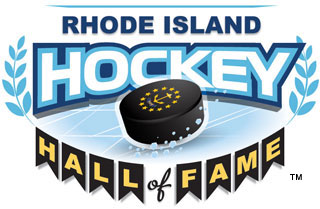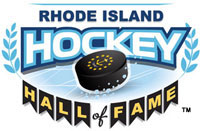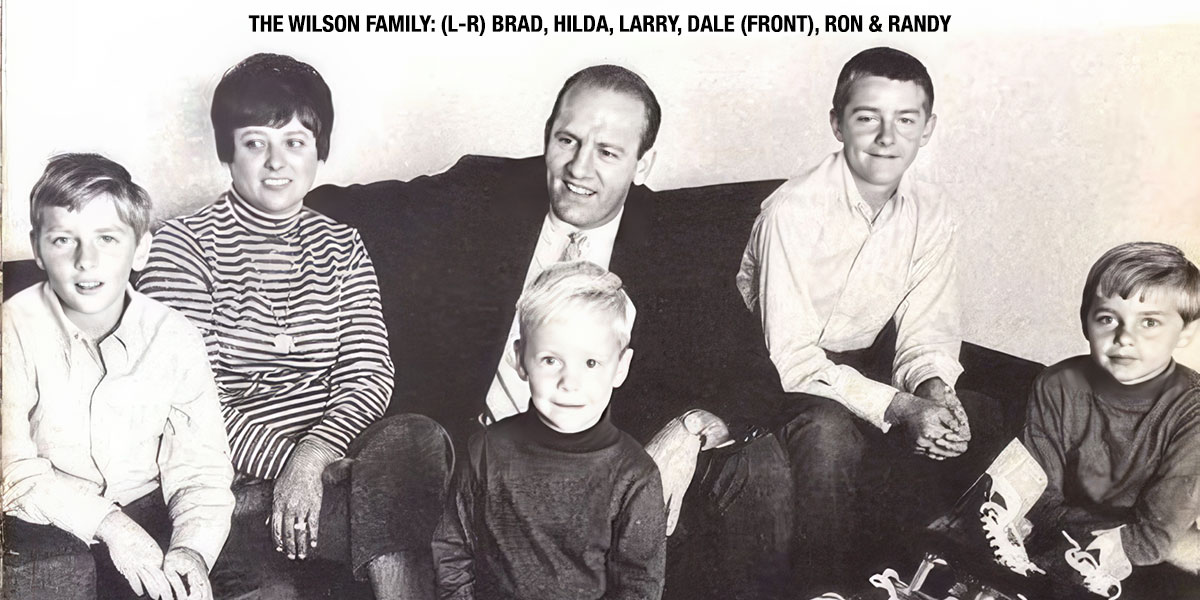When Larry Wilson came to Providence in 1970 to coach the R.I. Reds hockey team, he brought with him a long pro career in both the National and American Leagues, a family legacy in the sport that featured his older brother’s many years in the pros, and young sons on the verge of success in the game.
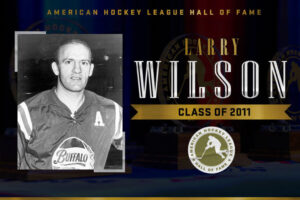 Larry’s own playing career featured 13 seasons with the Buffalo Bisons and eventually was capped by his election to the AHL Hall of Fame. His two-season assignment as head coach of the Reds would twice lead that team to the AHL playoffs, one of those years to the Calder Cup finals.
Larry’s own playing career featured 13 seasons with the Buffalo Bisons and eventually was capped by his election to the AHL Hall of Fame. His two-season assignment as head coach of the Reds would twice lead that team to the AHL playoffs, one of those years to the Calder Cup finals.
His brother Johnny’s NHL playing career would extend to 688 games over 14 seasons with four teams, then seven more years as a head coach.
And three of Larry’s sons – Ron, Randy and Brad – would become stars at East Providence High School and at Providence College, then expand to a hockey world that was truly global and made the Wilsons one of Rhode Island’s great hockey families.
Overall, the Wilsons have been connected as players and/or coaches to 11 teams in the National Hockey League and nine in the American Hockey League. They’ve been with teams in four different countries (the United States, Canada, Switzerland and Germany) and at every level from youth hockey, to interscholastic, to college, to the Olympic games and other international competitions, to the pros.
Near the end of his 32-year pro career, Larry Wilson spent only two years in Rhode Island, but it was at a time when his hockey-playing sons were nearing high school age. Ron, Randy and Brad all had been born in Ontario, the same Canadian province of their dad’s birth, the three brothers in Windsor and their dad in Kincardine.
Leaving the Reds, Larry moved on to the Richmond Robins, where he spent four years coaching that fledgling AHL team. His family remained in Rhode Island, where Randy and Brad would learn about the game in their new home city’s youth hockey leagues, then join older brother Ron to begin their domination of interscholastic hockey as the next chapter of the proud legacy of this special hockey family.
(Larry’s fourth son Dale is several years younger and grew up in Virginia, Baltimore and Kansas City, where the sport of baseball was more of an attraction, according to Randy.)
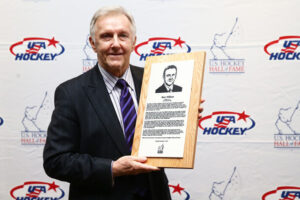 Larry was the family’s hockey catalyst and guide. Ron explained what that meant during his own induction into the U.S. Hockey Hall of Fame in 2017.
Larry was the family’s hockey catalyst and guide. Ron explained what that meant during his own induction into the U.S. Hockey Hall of Fame in 2017.
“I always followed in my dad’s footsteps as did my brothers Randy and Brad. Our dad included us in everything. He always had three caddies playing tape hockey in the hallway when he was playing or coaching.” All three sons mentioned that Larry, despite his hockey experience, never interfered with their coaches as they were learning the game.
Randy mentioned that their mother, Hilda, also had a role in their development. “She had been a figure skater and taught us a lot about skating,” he recalled. “She also did a lot of driving us to games and practices at so many different rinks,” recalling times when a roll of black tape became their puck.
Brad offered another way in which hockey and families can be a natural combination: “The game of hockey reminds me of a family. It’s the camaraderie that makes the game so special. There may be 20 players on a team but all are needed. It’s truly a team game and is sort of like a family. Early on, for kids, hockey requires the commitment of parents. They lead the way in getting up early, getting to practice, making sure everyone has the right equipment. It requires a total family commitment.”
Look first at Larry’s career as player and coach, in addition to his commitment as father and brother. He began his organized hockey life as a 17-year-old with the Windsor Spitfires teams of the International and Ontario leagues. Two years later he rolled up 79 points in 70 games with the Omaha Knights of the United States League, good enough to earn him a late-season promotion to the NHL’s Detroit Red Wings to join the likes of Gordie Howe, Ted Lindsay, Red Kelley and other stars for one regular season game and four playoff contests.
Then the Wings sent him to their American League farm club for two years before recalling him for parts of two more seasons. In all, Larry would play 152 games in the NHL with the Wings and Chicago Black Hawks, before spending the first of 13 standout seasons in Buffalo with the AHL Bisons. His NHL career totals include 21 goals and 48 assists for 69 regular season points, plus 75 penalty minutes.
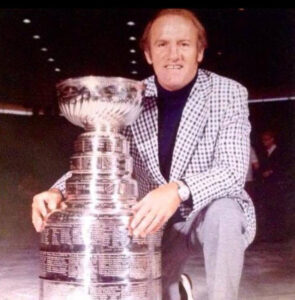 His name is engraved on one Stanley Cup, that coming during his first stint with the Red Wings in 1950.
His name is engraved on one Stanley Cup, that coming during his first stint with the Red Wings in 1950.
It was in Buffalo where his playing career blossomed. The Buffalo Sports Hall of Fame praised him as “arguably the most recognizable figure in Buffalo Bisons history” when he was enshrined there in 2015. In 2021 his career earned him induction into the American Hockey League Hall of Fame.
He scored 20 or more goals during eight of his 13 seasons, reaching a high total of 39 in 1955-56, good enough to finish eighth in the league in scoring. That was his first season with the Bisons, and a portend of things to come.
(Among those ahead of Wilson in the AHL’s list of scoring leaders were the three members of the Calder Cup winning R.I. Reds’ first line. Zellio Toppazzini led with 113 points, Camille Henry was third with 91, including the top-of-the-league 60 goals, and their center Paul Larivee, sixth with 86 points.
During Larry’s career with Buffalo, the lanky (5’11”) left winger would lead the Bistons to the Calder Cup league championship in 1963. By the time he played his last AHL game in 1968, his final Buffalo totals, including playoffs, reached 827 games played, 271 goals scored, 441 assists, and 712 points, all of which rank first in the franchise’s long history. He also had 514 penalty minutes, placing him second in Bison’s history.
After his playing days he coached for another 11 years, including part of a season with the NHL Red Wings. He began that part of his hockey career winning two International Hockey League championships with the Dayton Gems.
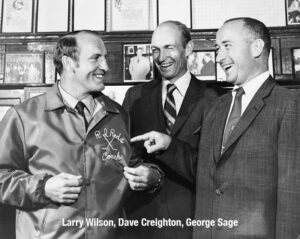 Then, for the 1970-71 season, he took over as head coach of the Reds in Providence, succeeding Dave Creighton, a former teammate in the NHL with the 1954-55 Chicago Black Hawks. Larry led the Reds to the playoffs both seasons but left after two years to coach the Richmond Robins, a new AHL franchise. He sadly passed in the summer of 1979 at the age 48, suffering a heart attack while jogging.
Then, for the 1970-71 season, he took over as head coach of the Reds in Providence, succeeding Dave Creighton, a former teammate in the NHL with the 1954-55 Chicago Black Hawks. Larry led the Reds to the playoffs both seasons but left after two years to coach the Richmond Robins, a new AHL franchise. He sadly passed in the summer of 1979 at the age 48, suffering a heart attack while jogging.
Larry’s older brother Johnny’s playing career was highlighted by 14 seasons in the NHL, plus three in the AHL. He skated for the Red Wings for eight of those seasons, and two each with the Black Hawks, Rangers and Maple Leafs. His regular season career NHL totals were 688 games, 161 goals and 171 assists for 332 points, with 190 penalty minutes, plus another 68 playoffs games in which he scored 14 goals and 13 assists. Four of his teams were Stanley Cup winners.
But Johnny wasn’t through. In 1965 he turned to coaching, beginning at the collegiate level at Princeton University for two years. Then came another 13 seasons coaching in the NHL, the AHL and the Western Hockey League.
A highlight was the Calder Cup title his Springfield Kings won in 1971. That was one of the many times the careers of the two brothers crossed paths either as players or coaches. They were the opposing coaches in the AHL championship series in 1971, with Johnny’s Springfield team beating out Larry’s Providence Reds.
Brad recalls that playoff series as uniquely important within the family: “There was obviously a lot of interest in the family but certainly no jealousy or ill feeling. When the Reds lost to the Kings it was certainly bittersweet for us, but Springfield did have a very strong team. The Reds had won the Eastern Division but Springfield got hot in the playoffs behind Butch Goring’s goal scoring.”
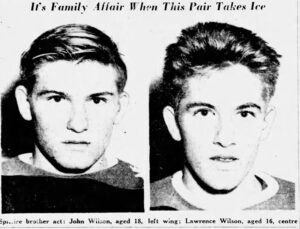 Larry and Johnny had played together as youngsters with their hometown Windsor Spitfires, then with the AHL Indianapolis Capitals, parts of three seasons with the Red Wings and one with the Black Hawks in the NHL.
Larry and Johnny had played together as youngsters with their hometown Windsor Spitfires, then with the AHL Indianapolis Capitals, parts of three seasons with the Red Wings and one with the Black Hawks in the NHL.
How highly thought-of were the two brothers? In 1954, when Topps Gum Company produced its first-ever series of hockey cards, just 60 of the best NHL players were included. Both Wilson brothers made it onto cardboard, Johnny on card number 4 pictured as a Red Wing’s left wing and Larry on card number 40 as a Black Hawks center.
Ron Wilson’s images are on more than a dozen cards, the earliest as a player and the more recent as a coach, except for a 2022 Upper Deck issue that commemorates the centennial anniversary of the Maple Leafs.
What led up to those cards and other honors is impressive, and he has said his development as a hockey player really began when his family moved to Rhode Island.
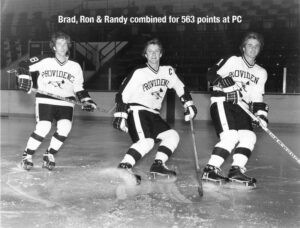 He became a three-time All-State selection at East Providence High School, a two-time first team All-American at Providence College, the ECAC Player of the year in 1975 and named to that conference’s All-Decade Team for the 1970s. During the 1976-77 season he and his two brothers ranked first, second and third among PC scorers (Ron with 62 points on 17 goals and 42 assists, Brad with 43 points on 14 goals and 39 assists, and Randy with 41 points on a team-leading 19 goals with 22 helpers).
He became a three-time All-State selection at East Providence High School, a two-time first team All-American at Providence College, the ECAC Player of the year in 1975 and named to that conference’s All-Decade Team for the 1970s. During the 1976-77 season he and his two brothers ranked first, second and third among PC scorers (Ron with 62 points on 17 goals and 42 assists, Brad with 43 points on 14 goals and 39 assists, and Randy with 41 points on a team-leading 19 goals with 22 helpers).
Ron is the Friars’ all-time leading scorer. He led the nation in points in the 1974-75 season, collecting 87 points on 26 goals and 61 assists in just 26 games. He still holds the school records (and NCAA records for defensemen) in career points (250), assists (172), most points in a single season (87) and single-season assists (61).
And Ron also found time to be a member of the 1975-76 U.S. Olympic team, beginning what would be a long and successful connection to hockey on an international level.
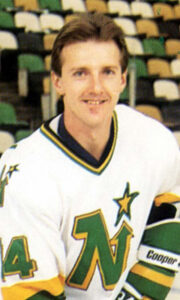 As mentioned previously, the Maple Leafs selected him in the eighth round of the 1975 NHL Entry Draft in 1975. He then played as a pro with Toronto and the Minnesota North Stars, New Brunswick in the AHL, Dallas in the CHL, and overseas with Davos HC and Kloten HC in Switzerland.
As mentioned previously, the Maple Leafs selected him in the eighth round of the 1975 NHL Entry Draft in 1975. He then played as a pro with Toronto and the Minnesota North Stars, New Brunswick in the AHL, Dallas in the CHL, and overseas with Davos HC and Kloten HC in Switzerland.
His career then turned to coaching and when that was over he had become the winningest American head coach in National Hockey League history with 648 regular-season wins and another 48 in the playoffs. Among the highlights was an Eastern Conference championship with the Washington Capitals in 1998. His other head coaching positions were with Anaheim, Vancouver, San Jose and, of course, Toronto.
Ron also achieved a distinguished career on the global stage. As a player for Team USA, he was in four IIHF Men’s championships (1975, 1981, 1983 and 1987) and one Spangler Cup (1988), serving as captain in the latter’s title-game win over Canada.
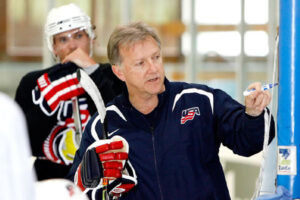 He also served as head coach or assistant coach nine times for Team USA. In 1996 he coached the team to victory in the inaugural World Cup series and in 2016 led the U.S. National Junior team to a bronze medal in the IIHF World Junior tourney. He also coached USA teams to a silver medal in the 2010 Winter Olympic Games and a bronze in the 1996 IIHF Men’s World championships.
He also served as head coach or assistant coach nine times for Team USA. In 1996 he coached the team to victory in the inaugural World Cup series and in 2016 led the U.S. National Junior team to a bronze medal in the IIHF World Junior tourney. He also coached USA teams to a silver medal in the 2010 Winter Olympic Games and a bronze in the 1996 IIHF Men’s World championships.
In 1990, Ron was inducted – along with brothers Randy and Brad – into the Providence College Hall of Fame. That was followed by his enshrinement in the U.S. Hockey Hall of Fame in 2017 and then in the inaugural class of the R.I. Hockey Hall of Fame in 2018.
One of his fellow inductees into the U.S. Hall Hockey Hall of Fame was legendary Boston University coach Jack Parker. In his acceptance speech, the man who had led the BU hockey powerhouse for 40 years used the opportunity to praise Ron Wilson, saying:
“He was one of the greatest college players I ever coached against, and he also was a fabulous coach.”
Ron and his wife now reside in South Carolina and have two daughters, Lauren and Kristen.
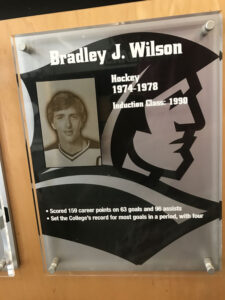 Brad is the second oldest son of Hilda and Larry Wilson, born in 1956, a little over a year after Ron in 1955 and about a year before Randy in 1957. When the family moved to Rhode Island, Ron was old enough to attend East Providence High, but Brad and Randy were of junior high age. So, while their older brother was playing hockey in the state’s Interscholastic League, Brad and Randy spent most of their ice time in the city’s newly established youth leagues, skating at the new Dudley Richards Memorial rink.
Brad is the second oldest son of Hilda and Larry Wilson, born in 1956, a little over a year after Ron in 1955 and about a year before Randy in 1957. When the family moved to Rhode Island, Ron was old enough to attend East Providence High, but Brad and Randy were of junior high age. So, while their older brother was playing hockey in the state’s Interscholastic League, Brad and Randy spent most of their ice time in the city’s newly established youth leagues, skating at the new Dudley Richards Memorial rink.
One of the keys to their and the youth leagues’ development was Tom Army, who also later would play a role in the three brothers’ choice to attended Providence College where he had starred in both hockey and baseball. A member of another great R.I. hockey family, Army was the leader in the development of youth hockey in East Providence, along with the city’s new rink.
But before entering PC, both Brad and Randy followed Ron in dominating the high school hockey in R.I., with a remarkable coach named Joe Sprague as their mentor as he had been for Ron. All three brothers were All-State selections three times before PC welcomed them to the collegiate hockey ranks in three successive years. There, an important force was Lou Lamoriello, a legend at PC who would go on to attain that rank in pro hockey.
Injuries did begin to affect Brad and would limit his hockey future.
“One of the first was a serious concussion against Cranston East,” Brad recalls. “I got checked into the boards which, back then, weren’t as pliable and movable as they are now. It was like being knocked into a brick wall. That was sort of the start, but over time I’ve had six shoulder surgeries.” Injuries even shortened his senior year at East Providence, but he still was named to the “honorable mention” list on the All-State team.
Brad joined brother Ron in Switzerland, although he hadn’t played in about three years because of injuries.
“I went to Zurich and played for about two weeks, and I think I scored five points,” he recalls, “but I then left to return home mostly feeling glad I wasn’t injured again. I remember calling Ron and, with tongue in cheek, telling him not to call me (back to Switzerland) ever again.”
Brad had been drafted in 1976 by the St. Louis Blues (tenth round, 126th choice), but injuries limited how long he would be able to play.
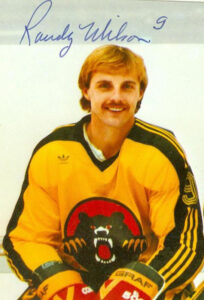 Now residing in Johnston, R.I., Brad and his wife have two sons – Jason, who played hockey at Bishop Hendricken, SUNY and Norwich Academy, and Jonathan,who played in prep school – and a daughter, Ashley, who lives about two miles away from him in Scituate. Brad has an accounting background and has long been involved in retirement consulting.
Now residing in Johnston, R.I., Brad and his wife have two sons – Jason, who played hockey at Bishop Hendricken, SUNY and Norwich Academy, and Jonathan,who played in prep school – and a daughter, Ashley, who lives about two miles away from him in Scituate. Brad has an accounting background and has long been involved in retirement consulting.
Randy Wilson not only followed brothers Ron and Brad to All-State honors at East Providence High but also joined them at Providence College, both on the ice and in that institution’s Hall of Fame. His citation for the latter included the fact that he led the Friars in scoring for two seasons, set the college’s record for most goals in a game with six, set the PC record for most goals in a season by a freshman with 30, and finished his career with 154 points (67 goals and 87 assists).
The Detroit Red Wings selected Randy in the 1977 NHL draft (seventh round, 109th selection), and he went on to play for the Wings’ Kansas City team in the Central Hockey League in 1978-79, the Johnstown Red Wings of the Eastern League in 1979-80, the Springfield Indians of the AHL in 1980-81 and the Maine Mariners, also of the AHL, in 1983-84. In 1981-82 he joined brothers Ron and Brad in Switzerland, netting 36 goals for the Swiss-A team.
Always a scorer who brought speed to his game, he potted 44 goals during his season in Springfield. His coach there was his uncle Johnny, but Randy already had experience skating under the direction of a family member. His coach during his season in Johnstown was his dad.
He recalled how his dad played it cool to avoid any semblance of favoritism when he scored his first goal there. “When I got back to the bench, he was standing behind us where coaches usually stand,” Randy says. “Rather that make a big thing of it, he put his foot on the bench behind me, leaned over and said ‘Nice goal’ in a way that didn’t make it appear he was playing favorites. That’s the way he was.”
Seekonk is now home for Randy and he’s a successful mortgage banker.
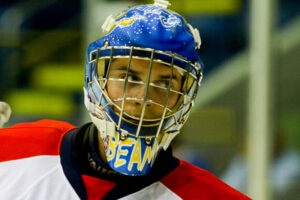 Randy’s son Brian added an interesting new chapter to the Wilson Family hockey history. He answers to “Brian Mahoney-Wilson,” Mahoney being his mom’s maiden name. He’s a goalie who starred at powerhouse Catholic Memorial in Massachusetts before he was selected by San Jose in the 2004 entry draft.
Randy’s son Brian added an interesting new chapter to the Wilson Family hockey history. He answers to “Brian Mahoney-Wilson,” Mahoney being his mom’s maiden name. He’s a goalie who starred at powerhouse Catholic Memorial in Massachusetts before he was selected by San Jose in the 2004 entry draft.
It was a draft pick with some ironic twists. First, the Sharks’ coach was his uncle, Ron Wilson. The way the draft was set up, the team made the pick known to the NHL but kept the specifics of it from Ron, who literally pressed the button to make the selection official. According to Randy, Ron was more than pleasantly surprised when he realized the selection of a goalie prospect was his own nephew.
And, for this region’s hockey fans, the irony goes a step further. San Jose had pulled off a pre-draft trade that ultimately landed Brian Mahoney-Wilson with his uncle’s San Jose team.
To San Jose, the Boston Bruins had traded the ninth-round pick (which turned out to be Brian), a fourth-round pick (which became Jason Churchill) and a third round pick (which became goalie Thomas Greiss) for a second round selection. The Bruins thus moved up in the draft and the player they picked turned out to be a young Czech center named David Krejci, long before he would eventually play in 1,192 games and net 274 goals for the Boston Bruins, including a comeback this past season.
All of which makes the Wilsons an even more interesting and in some ways unique lesson in how the sport of hockey has helped create enduring relationships in one of Rhode Island’s truly Great Hockey Families.
By Arnie Bailey
